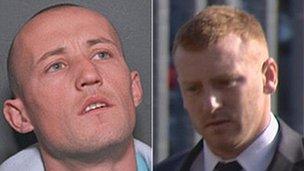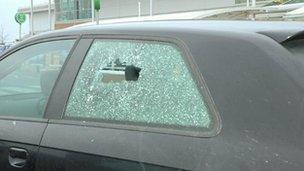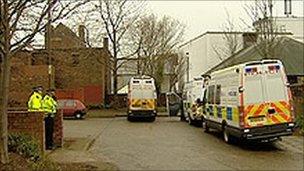Ross Monaghan acquitted of murdering Kevin 'Gerbil' Carroll
- Published
A man has been acquitted of murdering gangland figure Kevin "Gerbil" Carroll after a judge ruled that there was insufficient evidence to convict him.
Ross Monaghan, 30, denied shooting Mr Carroll, 29, in the Asda car park in Robroyston, Glasgow, in January 2010.
He was cleared at the High Court in Glasgow on Thursday. The Crown lodged an intention to appeal which prevented the judge's decision being reported.
The Crown formally withdrew the intention to appeal on Friday.
As he left court, Mr Monaghan said: "It's been a nightmare. I'm glad to get this over. I've always said it was nothing to do with me."
Trial judge Lord Brailsford acquitted Mr Monaghan after hearing two days of legal argument.
Appeal intention
The father-of-one was also cleared of attempting to defeat the ends of justice by disposing of the two guns used in the shooting and torching the getaway car on 13 January 2010.
Lord Brailsford acquitted Mr Monaghan on Thursday, but the decision had to be put on hold until Friday because the Crown Office said it might appeal.
Under new legislation, introduced as a result of the World's End murder trial, the Crown had 48 hours in which to indicate whether it intended to go ahead with the appeal.

Ross Monaghan (right) denied murdering Kevin Carroll in January 2010
If it had decided to appeal the case, it would have been heard in front of a panel of three judges at the High Court in Edinburgh.
The legislation governing these procedures became law in March this year.
This is one of the first cases where appeal has been considered by the Crown.
However, after consulting with Lord Advocate Frank Mulholland QC and solicitor general Lesley Thomson, advocate depute Iain McSporran, prosecuting, told the court that the Crown did not intend to appeal.
Acquitting Mr Monaghan, Lord Brailsford told him: "As you know I acquitted you on Thursday and the Crown said they may appeal against my decision.
"Today the Crown informed us this morning that they don't intend to appeal this. You are free to go."
No evidence
Mr Monaghan was acquitted after it emerged there was no evidence which placed him at the Asda store at the time of the shooting.
The trial also heard that when the Crown alleged the guns were being disposed of and the getaway car was set on fire, Mr Monaghan was, according to his mobile phone records, 20 miles away at home.
Defence QC Derek Ogg said: "There is nothing that links the crime with Ross Monaghan.
"No-one sees him and no-one sees anyone like him. Nothing links him to Asda. There isn't a shred of evidence."

Mr Carroll was shot dead in the Asda car Park in Robroyston on 13 January 2010
The only evidence produced against Mr Monaghan during the trial was the finding of a minute quantity - a tenth of a billionth of a gram - of his DNA on the handle of one of the guns used to kill Mr Carroll.
The DNA of a lab technician, who had never touched the gun and worked three floors above where it was stored, was also found in the sample analysed by forensic scientists, along with that of three unidentified men.
Defence QC Derek Ogg said: "This incident with the lab worker just shows how mobile DNA is and how it can innocently transfer from one place to another."
A single particle of firearms discharge residue - invisible to the naked eye - was found on a jacket seized during a raid of Mr Monaghan's Penilee home in July 2010.
But that evidence was discredited when a firearms officer admitted that he and his colleagues had been at a gun training exercise earlier, and were still wearing the same uniforms which would have been covered in firearms discharge residue.
After hearing from a forensic scientist, Lord Brailsford ruled that the particle was inadmissible as evidence because it was scientifically meaningless.
He said that it could easily have got on to Mr Monaghan's jacket through secondary transfer from the firearms officer's clothing.
Forensic expert Alison Colley, from the Scottish Police Service Authority (SPSA), told the hearing, which took place without the jury present, that a single particle was insufficient to draw any scientific conclusion from.
But she said she had been asked to form her conclusion using the particle at the request of a detective superintendent involved in the investigation.
The judge said he found her claim "disturbing".
Inadmissible evidence
The evidence about the particle found on Mr Monaghan's jacket was not heard by the jury as Lord Brailsford ruled it inadmissible.

Mr Monaghan was cleared of firearms charges over guns found in Coatbridge
Mr Monaghan spent six months on remand before being granted bail.
He was arrested by police 10 days before his heavily pregnant partner Jade McLaughlan, who has a rare illness, gave birth to their daughter Orla.
He was unable to be at the birth because he was in custody at the time.
His lawyer Calum Ross said: "He's really relieved this is finally over. It has been hanging over him for two years and he has always maintained his innocence.
"Ross has told me he would like to thank Derek Ogg, who came into the case at the last minute following the tragic death of Paul McBride QC."
Advocate depute Iain Sporran, prosecuting, said: "The Crown embarked on this case on the basis there was sufficient evidence.
"During the course of the trial the evidence changed."
Mr McSporran added: "The police left no stone unturned to find the killers of Kevin Carroll.
"I've rarely seen such an exhaustive investigation. They were met with a wall of silence from people who must know more."
Mr Monaghan had previously stood trial at the High Court case in 2005, one of two men accused of an attack outside a nightclub in Kirkintilloch the previous year.
However, he and his co-accused were acquitted after key witnesses could not identify the attackers.
- Published2 May 2012
- Published1 May 2012
- Published30 April 2012
- Published27 April 2012
- Published20 April 2012
- Published19 April 2012
- Published18 April 2012